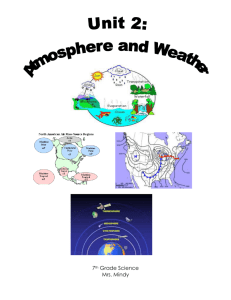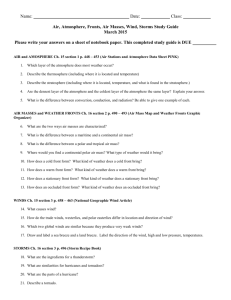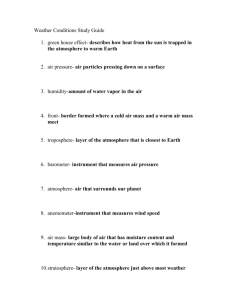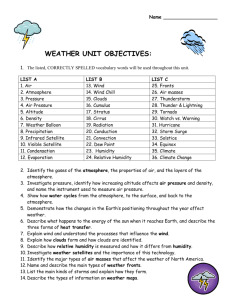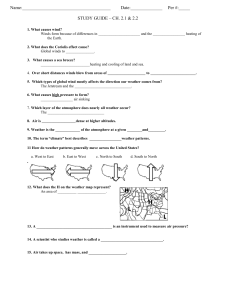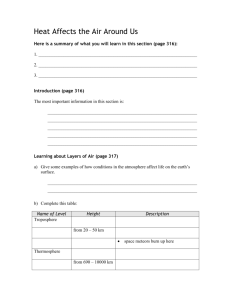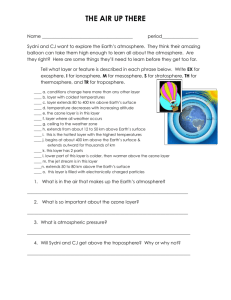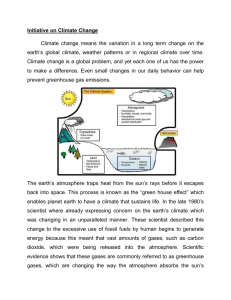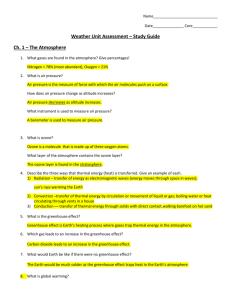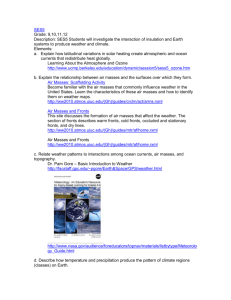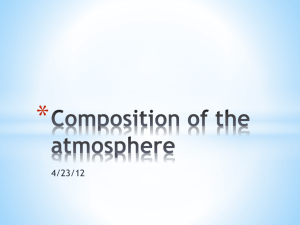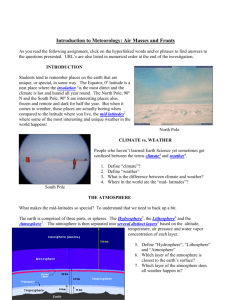Composition of the Atmosphere and Air Pressure Water Cycle
advertisement
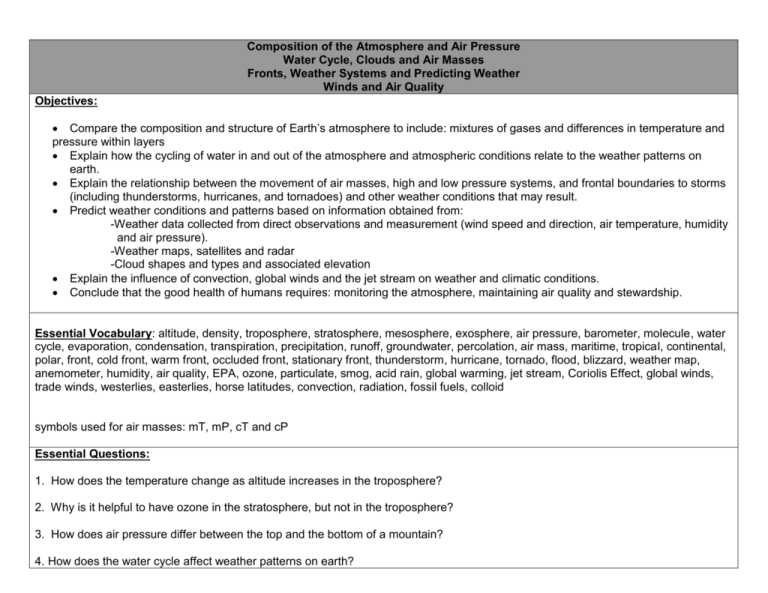
Composition of the Atmosphere and Air Pressure Water Cycle, Clouds and Air Masses Fronts, Weather Systems and Predicting Weather Winds and Air Quality Objectives: Compare the composition and structure of Earth’s atmosphere to include: mixtures of gases and differences in temperature and pressure within layers Explain how the cycling of water in and out of the atmosphere and atmospheric conditions relate to the weather patterns on earth. Explain the relationship between the movement of air masses, high and low pressure systems, and frontal boundaries to storms (including thunderstorms, hurricanes, and tornadoes) and other weather conditions that may result. Predict weather conditions and patterns based on information obtained from: -Weather data collected from direct observations and measurement (wind speed and direction, air temperature, humidity and air pressure). -Weather maps, satellites and radar -Cloud shapes and types and associated elevation Explain the influence of convection, global winds and the jet stream on weather and climatic conditions. Conclude that the good health of humans requires: monitoring the atmosphere, maintaining air quality and stewardship. Essential Vocabulary: altitude, density, troposphere, stratosphere, mesosphere, exosphere, air pressure, barometer, molecule, water cycle, evaporation, condensation, transpiration, precipitation, runoff, groundwater, percolation, air mass, maritime, tropical, continental, polar, front, cold front, warm front, occluded front, stationary front, thunderstorm, hurricane, tornado, flood, blizzard, weather map, anemometer, humidity, air quality, EPA, ozone, particulate, smog, acid rain, global warming, jet stream, Coriolis Effect, global winds, trade winds, westerlies, easterlies, horse latitudes, convection, radiation, fossil fuels, colloid symbols used for air masses: mT, mP, cT and cP Essential Questions: 1. How does the temperature change as altitude increases in the troposphere? 2. Why is it helpful to have ozone in the stratosphere, but not in the troposphere? 3. How does air pressure differ between the top and the bottom of a mountain? 4. How does the water cycle affect weather patterns on earth? 5. Explain the difference between a maritime and a continental air mass. 6. How do continental and polar air masses differ? 7. How do pressure changes affect the formation of air masses? 8. How does density affect frontal boundaries? 9. How do the cloud and weather types differ between cold and warm fronts? 10. Why is severe weather associated with low pressure systems? 11. How do meteorologists predict the weather? 12. Explain the difference between weather and climate. 13. How does the jet stream affect weather in the United States? 14. How does the Coriolis Effect affect flight travel in the United States? 15. How do pressure differences in the atmosphere affect wind speeds? 16. How do global warming and ozone depletion differ? 17. How do humans affect global warming? 18. How do humans affect ozone depletion? 19. How do fossil fuels relate to global warming? Helpful Websites: http://www.watchknowlearn.org/Video.aspx?VideoID=26860&CategoryID=2666 http://www.srh.noaa.gov/jetstream/atmos/layers.htm http://extension.usu.edu/files/publications/publication/NR_WQ_2011-9.pdf http://www.classzone.com/books/earth_science/terc/content/visualizations/es2001/es2001page01.cfm?chapter_no=visualization http://itg1.meteor.wisc.edu/wxwise/AckermanKnox/chap9/airmass_rev.html http://www.phschool.com/atschool/phsciexp/active_art/weather_fronts/ http://teacher.scholastic.com/activities/wwatch/severe.htm http://www.weatherwizkids.com/ http://teacher.scholastic.com/activities/wwatch/gather_data/ http://oceanservice.noaa.gov/education/kits/currents/05currents1.html http://www.epa.gov/climatechange/ghgemissions/ http://education.nationalgeographic.com/education/encyclopedia/greenhouse-effect/?ar_a=1 http://www.pbs.org/now/classroom/globalwarming.html http://hdgc.epp.cmu.edu/teachersguide/teachersguide.htm
